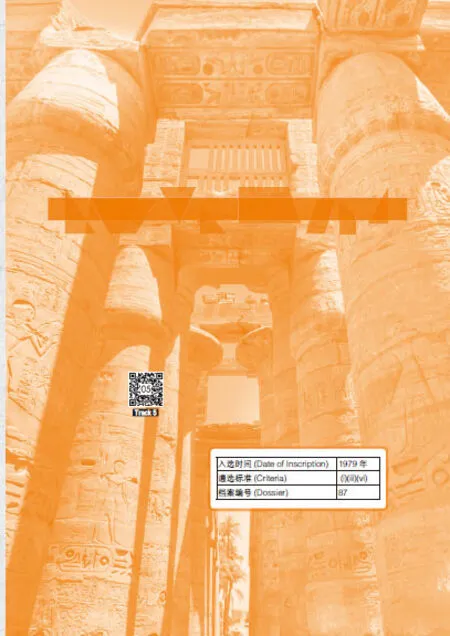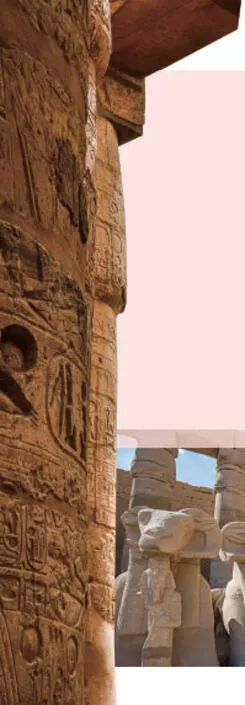Luxor Temple
◎熊娟娟

Track 5
卢克索是埃及的古城,古迹多到被称为全球最大的露天博物馆,有着“宫殿之城”的美誉。探访卢克索神庙,赴一场跨越千年的古今之旅,必然不虚此行。


The Luxor Temple is a renowned ancient Egyptian temple located on the east bank of the Nile River in the city of Luxor,Egypt.It stands as one of the most famous ancient temples in the world.Situated opposite the well-known Karnak Temple,it is part of the ancient city of Thebes and is a significant archaeological site with profound historical and cultural significance.With a history spanning over 4000 years,the temple has witnessed numerous additions,modifications,and renovations by different pharaohs and rulers,resulting in a unique1)fusionof architectural styles.The Luxor Temple served as a religious and ceremonial center,where rituals and offerings were performed to honor the gods and ensure prosperity for Egypt.
The temple’s construction began during the reign of Amenhotep III in the 14th century BCE and was continued by subsequent pharaohs,including Tutankhamun,Horemheb,and Ramesses II.The temple complex is characterized by the First Pylon,a massive structure adorned with intricate carvings and scenes depicting the military victories of various pharaohs.Beyond the pylon lies a large open court and a colonnaded courtyard,featuring rows of imposing columns with intricately carved capitals.Additionally,there are remnants of an ancient Christian church and a mosque within the temple2)precinct,reflecting the site’s diverse historical significance.
The architectural style of the Luxor Temple is a fusion of ancient Egyptian,Greek,and Roman influences.The grandeur and magnificence of the temple are evident in its colossal statues,towering columns,and intricate carvings.


In addition to its architectural splendor,the Luxor Temple houses a shrine dedicated to the goddess Hath or.This shrine,known as the Birth Room,featur es intricate reliefs depicting the divine birth of t he pharaoh,symbolizing his divine lineage and co nnection with the gods.The temple complex also includes smaller structures such as chapels and sa nctuaries,each with its own unique architectural an d religious significance.
The Luxor Temple’s inclusion in the UNESCO World Heritag e list in 1979 further solidified its status as a g lobally significant historical and cultural site.Visitors from around the world come to marvel at it s3)grandeur,explore its intricate details,and im merse themselves in the ancient world of Egypt.
1) fusionn.融合;溶解
2) precinctn.范围;界限
3) grandeurn.伟大;宏伟

卢克索神庙是埃及卢克索市尼罗河东岸的一座著名古埃及神庙,也是世界上最著名的古代神庙之一。它与另一座著名的神庙卡纳克神庙相对,是古底比斯城的一部分,是一个具有重要历史和文化意义的著名考古遗址。卢克索神庙的历史超过4000 年,见证了不同的法老和统治者进行的多次扩建、改建和修缮,形成了一种独特的建筑风格的融合。卢克索神庙作为一个宗教和仪式中心,用于进行祭祀和供奉活动,以此来敬拜诸神,并确保埃及的繁荣。
卢克索神庙的建造始于公元前14 世纪埃及第十八王朝的阿蒙霍特普三世的统治时期,并由后来的法老,包括图坦卡蒙、霍雷姆赫布和拉美西斯二世继续建造。卢克索神庙以第一塔门为特色,这是一座巨大的建筑,装饰着复杂的雕刻,描绘了各位法老军事胜利的场景。塔门后是一个宽阔的开放庭院和一个有柱廊的庭院,其中有雕刻精美的柱子。此外,神庙区域内还有古代基督教教堂和清真寺的遗迹,反映了该遗址多元的历史意义。
卢克索神庙的建筑风格融合了古埃及、古希腊和古罗马的元素。神庙的宏伟和壮丽体现在其巨大的雕像、高耸的柱子和复杂的雕刻。
除了建筑壮丽,卢克索神庙还设有一个供奉女神哈索尔的神龛。这个神龛被称为“诞生室”,上面有精美的浮雕,描绘了法老的神圣诞生,象征法老神圣的血统与神的联系。神庙群还包括小堂、圣所等较小的建筑物,每个建筑物都有其独特的建筑和宗教意义。
卢克索神庙于1979 年被列入联合国教科文组织世界遗产名录,进一步巩固了它作为全球重要历史和文化遗址的地位。来自世界各地的游客前来欣赏卢克索神庙的宏伟壮丽,探索其精细的细节,并沉浸在古埃及世界中。

